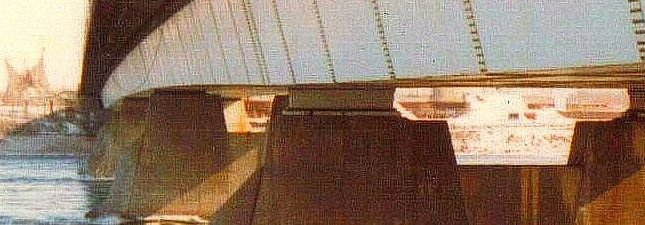 |
| Copyright 2010 - A. Barake |
After having enjoyed Bryson's "A Short History of Nearly Everything", which I think is his masterpiece, I picked up his book of columns on returning to live in North America, New Hampshire specifically. Like his other travel chronicles, it is an amusing collection of his peculiar collisions with everyday reality, filtered and edited extremely cunningly, but apparently effortlessly. He is an artist of the everyday, a likable author, although I have become suspicious about amiable literary personae since I read Witold Rybczynski's gentle books on history and architecture. You see, he taught classes at McGill while I was there, and he certainly was not amiable. Maybe he did not like teaching.. who knows, but I was very surprised as how radically his literary voice differed from his aural one.
So Bryson is well edited, slick, fun. Low on big content, even less than Witold, but big on small stuff, except in his science book, which I have acknowledged above and cannot recommend enough.
Let us move on, towards the synthesis that I am trying to circle, using the next guy in the list. Palin. Specifically his novels, and more specifically his latest, "The Truth". I think it is a ripping yarn, perfectly suited for a TV short series, but I also think that it is a failure as a novel. It tries hard, with many details taken from life, that may resonate with some readers, that surely resonate with the author, clear descriptions, characterizations and lots of touching interactions with minor characters, yet the voice of a novel is missing. The writing is friendly but fluffy, verbose almost, requiring editing. I wanted to edit it while I was reading it. Michael, I offer my services officially if you wish. It just needs tightening up to become a good novel. It needs excising of noise as well as the addition of texture for coherence, it needs a drive, a plot that gels, not just a good story. And by the way, I think Palin is truly amiable, not someone with a dual persona. What you read is what you get. A huge success and role model due to innate talent and goodness, not editing. Just sayin'.
Then there is O'Hanlon, who had been sitting on my shelf unread for years, I mean the Borneo book that made his name. What a hoot. Apparently the man was coming out of years of slogging at his thesis, a bit down, when he decided to hit the jungle with a friend who happens to be a great poet, but who comes off as a calm, wry and stabilizing partner but ultimately a side-kick in the book, not the way he sees himself I would think.
O'Hanlon can write. The stuff is direct, intelligent, and gets into your head like a conversation over drinks late at night. It was written by Redmond for Redmond, but it makes one want to be Redmond, or at least to be around him. Of course it is a sort of advertisement for himself, but it is brilliantly self-deprecating, and smart as well as genuine, a masterpiece. I will read his other stuff to see if my opinions about his truth can be sustained.
I have written about Paul Theroux and Coetzee here before, particularly about how I think they shape their voice, how they manage to write freshly when so much of the plain style has already been done before them, on the same subjects. Their trick is individualism, filtering common experience and internalizing the world in a deeply reflective way. The other guys I mention in this essay go there too now and then, O'Hanlon being my favorite, but Palin being the most honest about it I think. Bryson is a journalist, so it is difficult to tell if and
when he will turn on you, or how deep the stuff goes with him. It may be just copy.
Where does fiction and meta-fiction intersect with the travel story? Palin's book is an attempt, but as I said, I think it fails. O'Hanlon is pure travel, no fiction. Bryson is column journalism, short narrative, with some
exagerration for fun. Theroux does walk across the border into the country of the novel, he is aware of how lying well is an art. Coetzee too, but by avoiding the lie, by mixing characters with self, by doing the meta fiction thing very well.
I wish some of the lesser meta-fiction types writing today (who would use any mention of their name as advertising) would put in the effort to reach the borders of that territory rather than re-treading the plain biographical noise with outrageous urban experience that is so common. Bukowski, Cohen, Kerouac all did it very well, but they were also poets, and that is their legacy, their context. Meta navel gazing only works if you prove yourself through poetry too. Coetzee does it with prose alone.

No comments:
Post a Comment